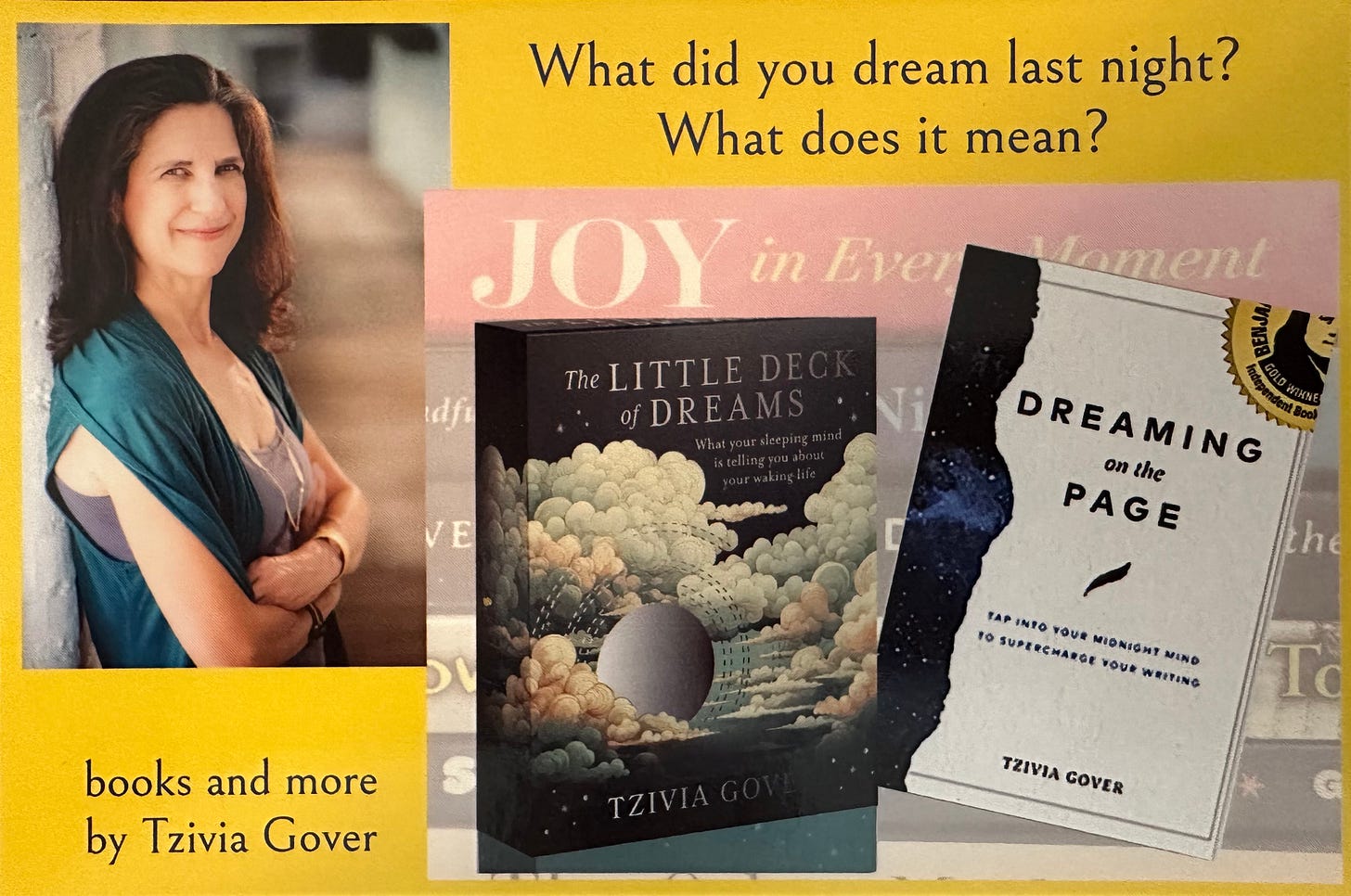When words dream together
Welcome back to ‘This Dream is a Poem,’ where we explore the intersections between dreams and writing. This week we’re looking at words that cozy up in pairs, and we’re turning our pajamas inside out.
“… poetic concentration allows us to bring the dream mind’s compression, displacement, wit, depth, and surprise into our waking minds.”
Jane Hirshfield, Nine Gates: Entering the Mind of Poetry
As a dreamy writer, I was thrilled to encounter a few new quotes, terms, and customs that connect dreams and poetry while reading Jane Hirshfield’s book, Nine Gates: Entering the Mind of Poetry.
I’ve already shared several inspiring ideas and techniques from this book in previous posts (for example, here and here), and today I’ll offer a couple more.
Plus, I offer a dream incubation challenge for everyone and a bonus prompt (for member subscribers) at the end of this post, that I hope you’ll have some fun with!
Pillow words

In classical Japanese poetry, pillow words (makurakotoba 枕詞) are pairs of words that regularly appear together. You might say they snuggle side-by-side, dreaming.
Pillow words can serve as “filler” or as shorthand for recurring concepts within a body of work. Some examples I’ve gleaned from Japanese poetry include phrases like “dark-husked night,” “gleaming white,” and “a thousand-swift-swords.”
You might be more familiar with a similar use of word-pairing from classical Greek literature. For example, the Homeric epithet “wine-dark sea” is repeated twelve times in The Odyssey, and five times in the The Iliad. Functioning in much the same way that Japanese pillow words do, other Homeric epithets include:
Rosy-fingered dawn
Swift-footed Achilles
Grey-eyed Athena
I can’t think of any examples of pillow words in modern or contemporary English poetry, but maybe you can. (If so, please share!)
“It is within dreamlife we first learn to read rain as grief, or the way that a turtle’s walking may speak of containment and an awkward, impeccable fortitude.”
Jane Hirshfield, Nine Gates: Entering the Mind of Poetry
Turn your pajamas inside out
You probably won’t be surprised to learn that I collect lists of poets who draw on dreams, dream imagery, and dream states in their work: Lucille Clifton, Langston Hughes, Pat Fargnoli, Alice Notley, and many more.
Hirshfield introduced me to yet one more: Ono No Komachi, a poet from Japan’s Classical period. (You can find some of her poems here.)
Komachi writes hauntingly about waking from dreams of her absent lover, including in the poem “The Ink Dark Moon,” which Hirshfield translated in her book by the same name. In this poem, the poet describes turning her nightgown inside out to invite dreams of the one she is missing.
Now, I’ve been studying dreams and incubating them (requesting dreams on a particular question) for decades. But this was the first I’d heard of this custom of wearing pajamas inside out to dream about a longed-for loved one.
Dream prompt: Who or what are you missing?
Tonight before bed, write your intention to dream of a person, pet, or time of life that you are longing to reunite with.
Then turn your pajamas inside out, and affirm your intention to dream of who or what you are missing.
In the morning write down your dreams. Did someone or something you’ve been longing for appear?
If you don’t remember a dream, or if the dream you had didn’t line up with your incubation, try again!
More opportunities to dream and write together
Saturday, Sept. 21: Dreaming on the Page writing workshop at Forbes Library, Northampton, MA. Free. More info here.
Sunday, Sept. 29: The Yoga of Dreams, a workshop on finding joy in your dreams at Munson Library, Amherst, MA. Free admission with voluntary donations accepted. More info here.
Sunday, Oct. 20, Unearthing Sarah's Story with Creativity and Spirituality at Temple Beth Zion, Brookline, MA. More info here.
Sunday Nov. 3, The Poetic Dream: Tapping into the Subconscious for Creative Inspiration with Tzivia Gover (hosted by Hudson Valley Writers, via Zoom), Registration required, November 3, 12:30 pm - 2:30 pm. More info here.
Paid subscribers to this newsletter receive bonus content, writing prompts, discounts on 1:1 sessions and workshops, and the ability to comment and receive responses to posts. Also, when you choose an annual subscription you receive one of my books as a thank-you gift.
Keep reading with a 7-day free trial
Subscribe to This Dream Is a Poem to keep reading this post and get 7 days of free access to the full post archives.




